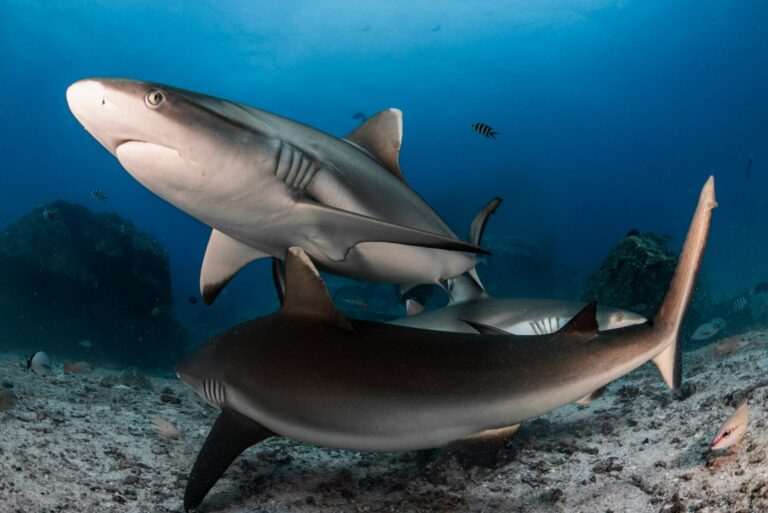Forget what you thought you knew about sharks – previous assumptions about how they breathe and whether they sleep have been upended by a chance underwater encounter in Seychelles, according to Save Our Seas Foundation (SOSF).
It all started when some of the foundation’s scuba diving researchers came across grey reef sharks taking it easy off one of the Indian Ocean islands.
“On routine survey dives around D’Arros, we found grey reef sharks resting under coral-reef ledges,” says Dr Robert Bullock, director of research at the Save Our Seas D’Arros Research Centre (SOSF-DRC). “This is not something we believed they could do.
“The grey reef shark has been considered a ram-ventilating species, unable to rest, so to find these ones resting turns our fundamental understanding of them on its head.”
Sharks breathe by passing oxygen-rich seawater through their gills, and have been divided into two types: “obligate ram ventilators”, which stay on the move continuously, and “buccal pumpers”, which can remain stationary but only by actively pumping water over their gills.
The grey reef shark was until now “the quintessential representative” of a shark that moves to breathe, says SOSF.
There had also been no solid evidence that ram ventilators ever slept. Scientists have hypothesised that if they do sleep, it is by using only half of their brain (like sperm whales and bottlenose dolphins), or by facing into ocean currents.
‘Tiptoeing around under water’
The research divers started encountering more grey reef sharks resting alone and in groups at different sites around Seychelles. Significantly, they noted that the sharks seemed “blissfully unaware” that they were being observed – suggesting that they were asleep rather than merely resting.
The sharks remained still, except for lower jaw movements that suggested to the scientists that though they are classed as ram-ventilators these sharks also had the ability to switch to buccal pumping.
Lying facing in all directions and with little-to-no currents, the sharks’ behaviour confounded previously held views about how sharks both breathe and sleep.
“There is something very special about ‘tiptoeing’ around under water at a depth of 25m and looking into the open eyes of sleeping sharks, moving carefully so as not to wake the peaceful beauties,” said Sea Change Project founder Craig Foster, one of the divers and co-author of a report on the Seychelles sharks.
“I love things that challenge our current thinking, and I’ve always thought of the grey reef shark as a clear example of a species that needs to swim to breathe,” said SOS Foundation CEO Dr James Lea. “Clearly not from this discovery! This raises all kinds of other questions: How are they coping? How long for? How often?
“It’s key to understanding how they use their environment and also how this may change in response to shifts in environmental conditions. How important is this rest, or possible sleep, for the sharks? And what’s the impact on them if they can’t get that rest if conditions change, such as oxygen levels rising or falling due to a changing climate?”
‘Wrong quite a lot’
The D’Arros research centre is one of three run by SOSF, which supports research, conservation and education projects concerning endangered sharks, rays and skates – the other centres are in South Africa and the USA.
The foundation hopes that understanding whether sharks sleep or not will enable better measure of their metabolism, behaviour and energy usage. “I hope that these findings serve as a reminder of how much we still do not know and how exciting that is,” said Bullock. “Science is about being wrong quite a lot. And that’s OK.”
“Knowing how our shark kin sleep is to be closer to their fascinating world and to wake up from our own slumber and realise we cannot live without these magnificent marine beings,” added Foster. The team’s study has just been published in Journal of Fish Biology.
Also on Divernet: Pygmy blue whales linked to Seychelles, Shark rivals adopt social distancing, Tiger shark genetics reveal surprising population separation, Giant trevally wanderlust revealed

